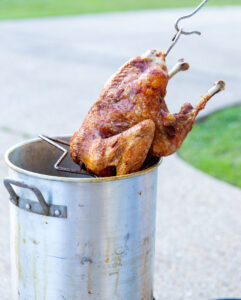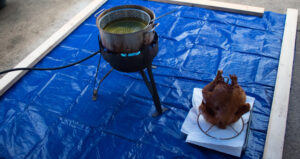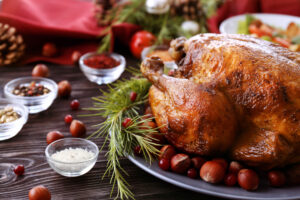The Dangers of Deep Frying a Turkey
Have you ever tried a deep fried turkey? If you haven’t you are surly missing out! Deep-frying a turkey promises a flavorful and less dry main dish on your Thanksgiving table. However, beneath the allure of a crispy exterior is a process potentially fraught with danger. There are very real dangers when it comes to deep-frying a turkey. According to the National Fire Protection Association and the FDNY Foundation, https://www.fdnysmart.org/deep-fryer-fires/ claims related to deep-frying turkeys are estimated at about $15 million annually and are responsible for more than 60 serious injuries and 5 fatalities per year.

As the Thanksgiving holiday approaches, it’s crucial to understand the risks associated with this cooking method. A good homeowner’s insurance policy should cover property damage or personal injuries but there are several things to note even if you have great insurance coverage.
There are deep fryers designed specifically for turkeys and using a fryer not intended for a turkey can result in disaster. Before you even attempt to fry your turkey, it is imperative that you confirm the turkey fryer, components, and cooking utensils are all designed for deep frying a turkey. A compromised fryer or faulty equipment can lead to malfunctions, leaks, or structural failures, significantly increasing the risk of accidents and injuries.
Once you’ve checked your equipment, the next step is to choose a location to minimize risks. Placing the fryer too close to structures, such as houses, garages, or flammable materials, increases the likelihood of fire spreading. You should maintain a safe distance to prevent the accidental ignition of surrounding structures.
All deep fryers include detailed instructions and a clear fill line. Overfilling the turkey fryer even by a small amount can have serious consequences. When the turkey is submerged in the hot oil, it displaces the liquid, causing spills and potential flare-ups. An overfilled fryer does not speed up the cooking time. An overfilled fryer poses a direct fire hazard and also increases the likelihood of burns and other injuries.
Most turkeys in the United States are sold frozen and a crucial step in preparing a turkey for deep frying is ensuring it is thoroughly thawed. You should never attempt to fry a frozen turkey. An improperly thawed turkey harbors moisture, and when that moisture meets hot oil, the result is a violent reaction. The splattering of hot oil can cause severe burns and create an environment where fire can rapidly spread.


One of the primary dangers of deep-frying a turkey lies in the use of flammable cooking oil. Peanut oil is the most common oil for its high smoke point. However, if the oil exceeds its smoke point and approaches the ignition point, it can catch fire. The consequences of a flaming oil disaster can be catastrophic, leading to property damage, injuries, or even loss of life.
With a house full of friends and family, most cooking accidents occur because of negligence. Unfortunately, deep-frying a turkey requires constant and full attention. You should never leave the fryer unattended. A momentary lapse in attention can lead to overcooking, flare-ups, or even an uncontrolled fire.
As many accredited insurance adjusters find in their investigation after a fryer fire, placing a turkey fryer on an unstable or uneven surface is a common cause. The hot oil inside the fryer can shift, especially when the turkey is lowered or removed. An unstable fryer poses a risk of tipping over, causing hot oil to spill, resulting in severe burns, property damage, and if ignited a quickly spreading fire.
Deep-frying a turkey requires a certain level of skill and experience. Ideally, you should not be testing your deep-frying skills for the first time the day of the meal. Inexperienced individuals may underestimate the risks, leading to inadequate safety measures and potentially hazardous practices. Lack of familiarity with the equipment and the process can result in accidents, injuries, and property damage.
We highly recommend having a fire extinguisher nearby, understanding how to use it, and knowing the appropriate fire safety protocols as these are essential components of responsible deep-frying.
Understanding the dangers—from flammable oil to improper thawing—and implementing safety measures can help prevent unintended consequences from running your meal and causing you to begin an insurance claim before dessert.
If you’re interested in helping people recover from a deep-fried turkey incident, navigate the various complexities and provide clarity and guidance to policyholders seeking to rebuild, you should consider earning your 6-20 ACA designation with Educational Services & Consulting (ESC).
We invite you to call our Clermont, Florida office at 1-800-309-2459 or read more about the accredited claims adjuster certification process on our website. Beyond our ACA courses, we have partnerships that allow our students to continue learning the proper ways to handle claims and continue to grow their career.
In Florida, once you earn your 6-20 accredited claims adjuster designation, you can apply to the state for your all-lines adjuster license. This will enable you to work on home insurance claims, auto and RV insurance claims and property insurance claims. You would have the flexibility to work as a staff claims adjuster or an independent insurance adjuster.
Even if you move out of the state of Florida or your practice takes you out of state, Florida has a reciprocity agreement with other states within the U.S. Individuals who obtain their Florida license are eligible to work in 34 of the 37 states across the U.S. that require an adjuster license.
Give us a call today and we can get you started on the path to helping others understand the complexities of their insurance claim!
